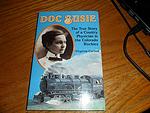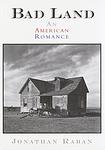The Greatest "Nonfiction, Frontier and pioneer life" Books Since 1980
Click to learn how this list is calculated.
This list represents a comprehensive and trusted collection of the greatest books. Developed through a specialized algorithm, it brings together 284 'best of' book lists to form a definitive guide to the world's most acclaimed books. For those interested in how these books are chosen, additional details can be found on the rankings page.
Genres
Frontier and pioneer life is a category of books that focuses on the experiences of individuals and communities who lived on the edge of civilization during the expansion of the United States in the 19th century. These books typically explore the challenges and triumphs of settlers as they established new homes, farms, and towns in the wilderness, often facing harsh weather, dangerous wildlife, and conflicts with Native American tribes. The genre also includes stories of explorers, fur traders, and other adventurers who ventured into uncharted territories, as well as memoirs and biographies of notable figures who played a role in shaping the American West.
Countries
Date Range
Reading Statistics
Click the button below to see how many of these books you've read!
Download
If you're interested in downloading this list as a CSV file for use in a spreadsheet application, you can easily do so by clicking the button below. Please note that to ensure a manageable file size and faster download, the CSV will include details for only the first 500 books.
Download-
1. The Solace of Open Spaces by Gretel Ehrlich
This book is a collection of essays that explore the author's experiences and observations after moving from the city to the rural landscapes of Wyoming. The narrative delves into the harsh and beautiful realities of living in the American West, the author's personal healing after a tragic loss, and the solace found in the vast open spaces. The book is a profound meditation on nature, solitude, grief, resilience, and the transformative power of landscape.
-
2. All But The Waltz by Mary Clearman Blew
"All But The Waltz" is a poignant memoir that weaves together personal narrative and the history of the American West. Through a series of essays, the author reflects on her family's past and the hardships they endured, including loss, isolation, and the struggle to maintain a ranch in the harsh Montana landscape. The book delves into themes of memory, identity, and the changing face of the West, as the author grapples with her own place in a lineage of strong but troubled ancestors. It is a meditation on the complexities of family legacy and the bittersweet dance of embracing one's heritage while stepping into the future.
-
3. Doc Susie: The True Story Of A Country Physician In The Colorado Rockies by Virginia Cornell
This book chronicles the inspiring life of a pioneering female physician who, in the early 20th century, left her comfortable city life to practice medicine in the harsh, unforgiving environment of the Colorado Rockies. Facing the challenges of isolation, gender bias, and limited medical resources, she earned the trust and respect of the rugged community through her tireless dedication, compassion, and medical skill. Her story is a testament to the indomitable spirit of an extraordinary woman who overcame societal constraints and personal adversities to serve the needs of her rural patients.
-
4. Once Upon An Eskimo Time by Edna Wilder
This book is a heartfelt collection of stories and memories that offer a window into the traditional lifestyle of the Inupiat Eskimos of Alaska. The narrative, rich with cultural heritage, is a personal account from the author's own experiences growing up in a remote village. It captures the essence of a community bound by survival, tradition, and the rhythms of the Arctic environment. Through tales of hunting, fishing, and sharing, the book paints a vivid picture of the values and practices that have sustained the Inupiat people for generations, while also touching on the challenges and changes brought by contact with the outside world.
-
5. Little Heathens: Hard Times And High Spirits On An Iowa Farm During The Great Depression. by Mildred Armstrong Kalish
"Little Heathens" is a memoir of Mildred Armstrong Kalish's childhood on an Iowa farm during the Great Depression. Kalish recounts the daily struggles and joys of life on the farm, from making do with limited resources to finding creative ways to entertain themselves. Through her vivid descriptions and humorous anecdotes, Kalish paints a picture of a resilient and close-knit community that persevered through tough times with a spirit of determination and optimism.
-
6. Prairie Fires: The American Dreams of Laura Ingalls Wilder by Caroline Fraser
This book presents a deeply researched biography of Laura Ingalls Wilder, the author of the "Little House on the Prairie" series. It provides an in-depth look into Wilder's life and the historical context in which she lived, from the westward expansion to the Great Depression and beyond. The narrative explores the complex relationship between Wilder and her daughter, the hardships they faced, and the ways in which these experiences shaped Wilder's writing. It also delves into the myths and realities of American frontier life, challenging the often-romanticized view of pioneer life.
-
7. Bad Land: An American Romance by Jonathan Raban
This book is a historical exploration of the American West, specifically the region of Eastern Montana. The author delves into the experiences of the British and Scandinavian settlers who were lured to this area in the early 20th century by railroad advertisements promising fertile farmland. Through a combination of historical research, personal narratives, and travelogue-style observations, the author paints a vivid picture of the harsh realities these settlers faced, including drought, isolation, and economic hardship. The book also reflects on the lasting impact of these experiences on the region's culture and identity.
-
8. The End of the Myth: From the Frontier to the Border Wall in the Mind of America by Greg Grandin
The book explores the concept of the frontier throughout American history, arguing that it has been a central myth that has shaped the nation's ideologies and policies, from its inception to the present day. The author traces this myth from the country's founding, through westward expansion, to the current political climate and the contentious issue of the border wall. The book suggests that the frontier has served as a symbol of freedom and opportunity, but also of conflict and exclusion, reflecting the country's struggle with its own identity and values.
Reading Statistics
Click the button below to see how many of these books you've read!
Download
If you're interested in downloading this list as a CSV file for use in a spreadsheet application, you can easily do so by clicking the button below. Please note that to ensure a manageable file size and faster download, the CSV will include details for only the first 500 books.
Download






